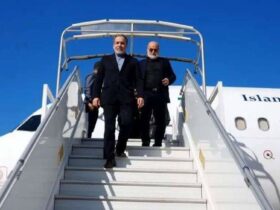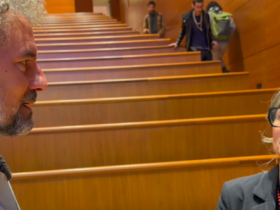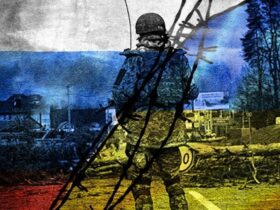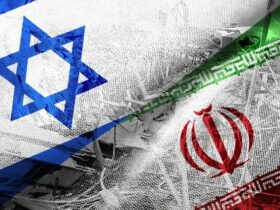By Prof. Dr. Halil Çivi
On September 22, 2024, The New York Times published an article citing Albanian Prime Minister Edi Rama. According to the article, a new “Bektashi State” is to be established in Albania’s capital Tirana. Modeled after the Vatican, this state is expected to have its own borders, passport, and an area of about 27 acres, founded on the principles of tolerance and pluralism.
The leader of this new state will be Edmond Brahimaj, known as “Mondi Baba” or “Baba Mondi”. If the reports are accurate, the borders of this Bektashi State have already been determined, and the necessary buildings are nearly ready for use and the official declaration of the foundation of the Bektashi State is imminent. The US has reportedly given Mondi Baba an armored car, on which both the Albanian and American flag fly.
This report emerged shortly after Albanian Prime Minister Edi Rama returned from his visit to the US, which strongly suggests that this state is an American project, not born from the needs or desires of the Bektashi community itself, nor the Alevi or Bektashi populations in the Balkans, Türkiye, or elsewhere. In fact, there has never been a demand for such a state from these communities.
Historically, the Balkans have been a highly volatile region. That is why the term “Balkanization” was coined to describe this very history. This new US-backed project could be aimed at destabilizing the region further by fostering religious, ethnic, and political unrest, using the Alevi and Bektashi communities.
So, what are the potential dangers of establishing a Bektashi State in Albania?
Potential dangers
1. The creation of a religious state, akin to the Vatican, could be seen as a long-term preparation for an Islamic Caliphate. Well, one could ask how possible for a Bektashi leader to be the Caliph. But Albania is a small country with a population of only about three million, and its Bektashi population is estimated at just 150,000, less than 10% of the total population. However, with future ideological or regime changes, this Bektashi State could be handed over to a Sunni leadership.
2. Several countries in the region (Greece, Bulgaria, Hungary, North Macedonia, Kosovo, Montenegro, and Romania) are one of historical homes to Bektashi, Alevi, and Sunni populations. By playing the Bektashi card, the Balkans could be plunged into a new doom of instability and conflict.
3. A US-backed Bektashi State could destabilize Albania demographically, religiously and culturally. It could turn Albania into a pawn for Washington.
4. In Europe and even in Türkiye, there are groups that consider Alevism and Bektashism non-Islamic and reject the fact of Caliph Ali. The establishment of a Bektashi State could be used to deepen divisions within the Alevi and Bektashi communities. In fact, it could even be part of an attempt to sever Alevism and Bektashism from Islam entirely and to lay the ground for a new religion.
5. Alevi and Bektashi communities in Türkiye have been staunch supporters of the War of Independence and an essential part of the foundation of the laic and democratic Republic of Türkiye. Their loyalty to the Republic and Atatürk is well known, the portraits of Haci Bektas Veli and Atatürk are on the walls of the cemevi (house of worship) and in Alevi houses.
In contrast, the Bektashis in Albania don’t like Atatürk that much, as they blame him for shutting down the Bektashi lodges in Türkiye. Leaders of this new planned Bektashi State could use their influence to spread anti-Atatürk and anti-Republic sentiments among the Alevi and Bektashi population in Türkiye.
6. The heart of Bektashism, if not Alevism, is in Anatolia. It was founded by Haci Bektas Veli who lived in Anatolia. The majority of the world’s Alevi and Bektashi population lives in Türkiye. So the idea of establishing a Bektashi State in a country where the Bektashi population is relatively small and far removed from Anatolia cannot be seen as an innocent or well-intentioned project.
Türkiye must therefore strengthen the newly created Directorate of Alevi-Bektashi Affairs under the Ministry of Culture, and ensure that the needs of the Alevi community are met. Cemevi should be officially recognized as places of worship, and there should be no invisible barriers preventing Alevis from entering public service.
Türkiye should not leave any room for perceptions of inequality and injustice toward its Alevi citizens.
7. As Haci Bektas Veli says, “The path that does not lead to knowledge ends in darkness”. His teachings are centered on morality, justice and human dignity. His teachings oppose gender discrimination and advocate for women’s right of education.
He spent his life fighting against religious bigotry and fanaticism.
But neither him nor his followers like Yunus Emre, one of the greatest poets of Anatolian Alevi-Bektashi do not have an idea of founding state and governing. So there is no theological justification for this planned Bektashi State in Albania.
8. Modern prosperous states are built on principles of rational thought, scientific inquiry, and laicism. These states are pluralistic, uphold the rule of law, and are governed by true democracies. So, no matter how pluralistic or open-minded the teachings of the Bektashi or Alevi faiths may be, a state founded on religious principles, whether Bektashi or otherwise, will inevitably become a theocracy.
Conclusion
From what I have learned from history, religion, politics, economics, and, above all, from my observation of imperialist powers, I can say that the establishment of a Bektashi State in Albania will not benefit;
– the Albanian people or the Albanian state
– the Balkans countries
– the Alevi and Bektashi communities
– the Islamic world
– Türkiye and the Alevi and Bektashi population in Türkiye
Instead, it is against the principles of modern statehood and will only serve the interests of imperialist powers like the US and its allies in the West.
In fact, the Alevi-Bektashi organizations in Türkiye have already voiced their opposition to the creation of such a state.

















Leave a Reply